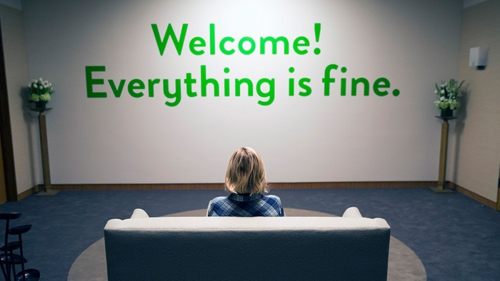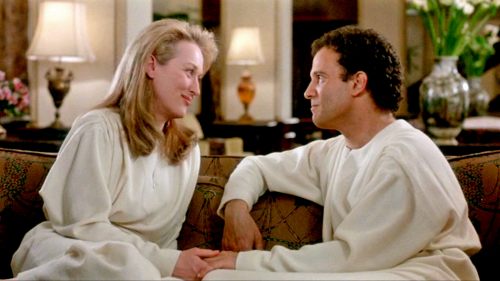Finding Life After Death At The Movies
What does it mean to live a good life? At the dawn of a new year, we write resolutions in a quest towards self-betterment often circumventing the existential doubt this question entails. Rather than confronting the gritty details of a lifelong quest to be better, there is this sense that with the right diet or a cleaner apartment, we might somehow cheat death. In art, this question is treated in a series of afterlife films and series where characters are confronted with their mortality and what it means to be good.
In Defending Your Life, Daniel (Albert Brooks) sits in an afterlife courtroom watching his nine-year-old self get beaten up. Presenting the clip in a trial on Daniel’s life, a prosecutor argues that in this moment, Daniel allowed fear to take control of his destiny. In this secular version of the afterlife, humans must defend their courage before being permitted to move onto the next stage of existence. Failure means returning to earth to try again and Daniel has already been sent back twenty times.
Being courageous in Defending your Life is judged on an individual basis. Just because Daniel never ran into a burning building does not limit his opportunity to move on. His case is measured only on its own terms and his decisions and actions are dissected in meticulous detail. His life, rather than be judged by grand dramatic gestures, is measured on the level of small life-shaping incidents that held him back and moved him forward. In this scenario, humans are ruled by fear and must prove they have sufficient courage in order to be allowed to move on.
While, for the most part, we are no longer surviving in caves or fighting the Crusades, our decisions are still largely motivated by fear. As part of a larger existential curse, the choice to be brave is not always obvious either. Like Daniel grappling over his schoolyard fight, it isn’t immediately clear if it is braver to punch back or to show restraint. The right moral choice does not always hinge on a fight of good versus evil, but measuring risk and moving forward. Part of the human experience is making choices that challenge us to be better, that force us to improve or change.
Frank Capra’s classic, It’s a Wonderful Life, features a similar structure. This holiday classic begins with George Bailey (James Stewart) standing on the edge of a bridge contemplating suicide. He meets an angel, Clarence, who helps show him what a wonderful life he had. Similar to Defending Your Life, George Bailey’s existence is largely made up of small gestures and incidents. He was a good man who made his community greater, but those accomplishments did not measure up to his ambitions to leave his small town and become a hero.
It’s hard not to relate to Bailey’s predicament. Suffering from a kind of early Imposter Syndrome, Bailey is unable to see his value due to his own neurosis and doubt. Furthermore, compared to his war-hero brother or the mega-rich Mr. Potter, he feels that his life is inadequate. Capra is able to edge out pastoral grace in Bailey’s contributions to the world by measuring value against individual potential. Every day we are given the chance to make the decision to be good or brave, and our choices will impact not only our lives but the lives of those around us.
These two films reflect on what it means to live a good life after you’ve had the opportunity to live it. They offer the opportunity for the viewer to reflect on their own contributions and decisions but offer little guidance in personal transformation. It's one thing to live a path along your own morals, it is another thing entirely to recognize your failures and motivate change.
Vincente Minnelli’s Cabin in the Sky deals with the difficulty in changing your habits. When Little Joe Jackson, a compulsive gambler, is killed in a club, he is given a second chance in life by merciful angels. Handicapped by no memory of his life, he has six months to turn his life around. With an angel on one shoulder and a devil on the other, a whole array of temptations, fears and misunderstandings are thrown in his way on his quest to become a better man.
Cabin in the Sky is a film that deals comically, though sincerely, with the difficulty in turning your life around. Joe Jackson, in spite of being a gambler and a cheater, is not a bad man. He has dug himself into a hole and it seems his sense of good and bad is somewhat skewed. In a way, the film illustrates how we often make bad choices when we are motivated by greed or laziness. Being good requires sacrifice and risk that often negate the immediate gratification of giving into temptation or taking the easy way out.
The struggle to make life changes is at the core of the NBC sitcom, The Good Place. Set in the elaborate universe of the afterlife, four characters are confronted with the choices and decisions of their humanity that might have landed them in the “Bad Place.” After death, they are challenged to try to make better choices and become better people. Confronted with infinite variations and a multitude of restarts, making the “right” choice becomes less clear.
Yet, over the course of the past three seasons, it is unmistakable that these four humans have become better people. This is not because of one specific act but because they are making a persistent and constant effort to do better and working together to achieve it.
For thousands of years, humanity has been working towards answering the question of what it means to live a good life, and we aren’t any closer to finding it. If we can learn anything from these films, it’s that self-improvement and goodness is a lifelong project. The right resolution won’t make us perfect, but it can help set us on a new path towards goodness. Above all else though, maybe the lesson is that a good life cannot be achieved by ourselves. In working on our resolutions for the year, maybe we should focus a little more on connecting with those around us and building our own community. Whether or not you believe in life after death, for now, the only life we have is this one. Why not make it the best it can be?



